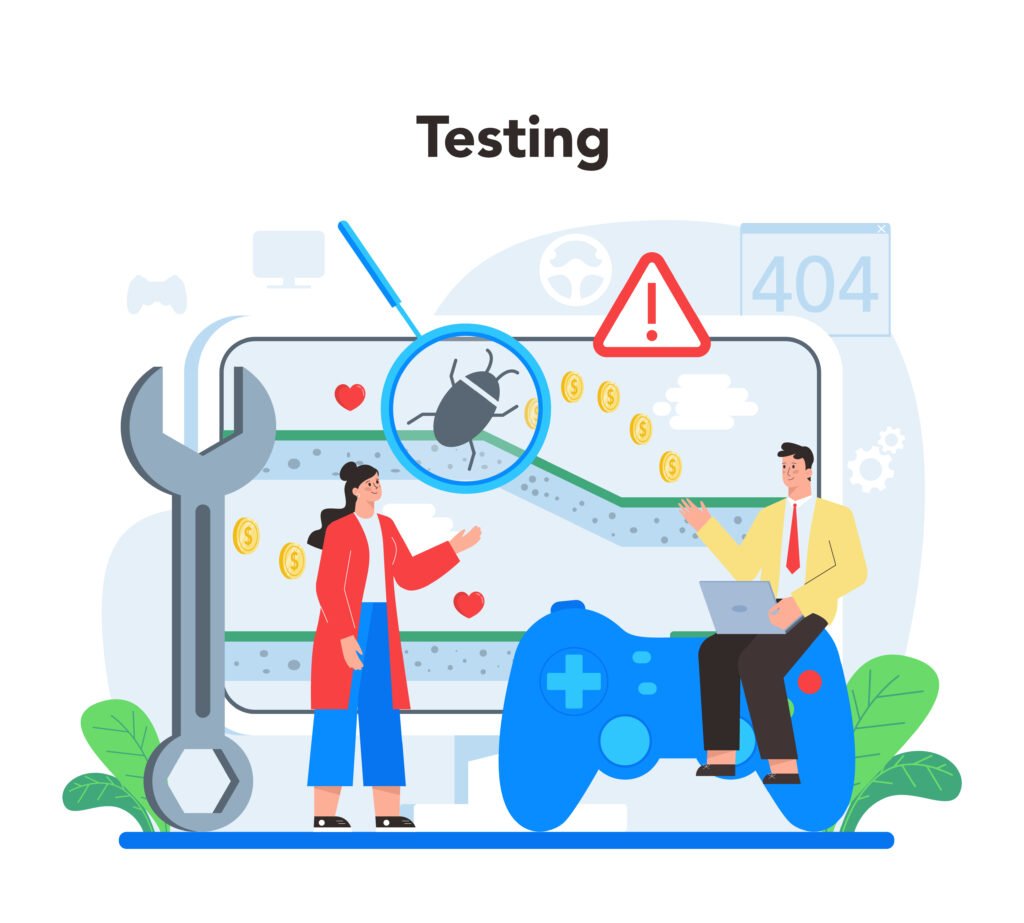Game Testing 101: A Comprehensive Guide to Quality Assurance in Game Development
Game Testing 101: A Comprehensive Guide to Quality Assurance in Game Development
No matter how brilliant a game’s graphics, story, or concept are, a single bug can ruin everything. That’s why the game testing process in game development is critical to success.
Unless the game testing process in game development is done thoroughly before release, bugs can create financial loss and legal trouble. Moreover, skipping proper QA ruins the player experience. Skipping proper QA ruins the player experience. Furthermore, it halts sales, tarnishes the studio’s reputation, and breaks player trust. In contrast, proper pre-release game testing ensures it ships smoothly with minimal issues, builds a loyal fanbase, and stays in business.
This beginner-friendly blog is your complete guide to the video game testing process. It answers the common questions like what is the game testing process, what its types are, and how is QA done in game development. Let’s explore how to get it right from the start.
Understanding the Game Testing Process in Game Development

Source: Business Insider
The game testing process in game development helps identify bugs, glitches, and performance issues before release. This covers critical game aspects like core mechanics, visuals, audio, UI, and system stability. While many confuse testing as something to be done after the game development, it actually begins early during the coding phase and is done throughout development. Consequently, this step-by-step approach ensures consistency. This step-by-step approach is part of the broader game testing process in game development. Thus, it ensures consistency and stability from start to finish.
It is important to understand how playtesting differs from QA in the game testing process in game development. QA validates technical stability using predefined cases. In contrast, playtesting improves the player experience. Along with finding the common bugs, a strong QA pipeline also identifies the areas of improvement to refine the gameplay. In addition, this makes the game more responsive and rewarding. This streamlines the game based on player feedback and makes it responsive, intuitive, and rewarding.
Manual game testing simulates player behavior. Meanwhile, automated testing uses scripts to detect common errors and apply best practices for fixing them. As games grow more diverse and complex, the testing procedure varies depending on the platform and genre. Therefore, a custom QA approach is a necessity for each title. With quickly shifting trends and player behavior, continuous refinements guided by player feedback also lay the groundwork for LiveOps to stay aligned with player preferences.
The High Cost of Skimping on QA
Small to large production, many games have failed mainly due to inadequate testing and quality assurance. Failed launch and backlash have also made studios issue public apologies, refund players, and retract their games from the stores.These failures highlight why the game testing process in game development must be taken seriously. In fact, they prove that skipping QA can destroy even big-budget titles. Listed below are some of the biggest launch failures in history, primarily due to improper testing and rushed launch:
1. Cyberpunk 2077

Source: Fandom
CD Projekt Red launched Cyberpunk 2077, but it quickly became infamous for bugs. Players faced missing textures, unresponsive NPCs, and frequent crashes. The studio faced massive online backlash, followed by an estimated $51.2 million in refunds and a 75% drop in stock value.
2. The Lord of the Rings: Gollum
Source: Fandom Wire
3. Suicide Squad: Kill the Justice League

Source: Steam
The game came out with several bugs, like server issues, infinite loading, gear slot lockouts, and frequent crashes that failed to live up to the reputation of DC. According to Warner Bros., the failure contributed to a loss of $200 million in revenue, highlighting how even major brand labels can’t save a game passed without proper game testing.
4. New State Mobile

Source: TOI
Developed by PUBG Studios and Krafton, New State Mobile is an intense battle royale that lost its massive hype of 50 million pre-registrations to bugs. Players experienced server bugs, inconsistent gyroscope sensitivity, graphic glitches, and a lack of support on low-end devices. Krafton publicly acknowledged the issue and announced emergency maintenance, followed by compensating players with in-game rewards.
Types of Tests in the Game Testing Process in Game Development

The game testing process in game development includes multiple levels, each targeting specific aspects such as mechanics, features, UI, and compliance. Listed below are the key video game testing types to consider:
- Functional Testing: Functional testing is the foundation of QA. It ensures core mechanics like combat, movement, and interactions work as intended. Predefined test cases are run to test the features of the game in different scenarios, including edge cases.
- Regression Testing: When a game receives an update, a poor integration might create several new problems elsewhere in the code base. Regression testing ensures that the changes don’t break existing systems or bring back the old ones.
- Compatibility Testing: This conducts performance testing for games across different devices, processors, and operating systems to ensure a consistent experience. For instance, an elusive bug might present itself on an AMD chip but remain absent on Intel. Especially in cross-platform game development, compatibility testing is done to fix UI issues that may emerge under specific configurations. Similarly, localization testing ensures regional accuracy.
- Ad Hoc Testing: This is an unstructured form of testing that allows unscripted exploration of bugs. This form of testing relies on intuition and experience to find obscure bugs that might not present themselves under structured tests.
- Localization Testing: This type of testing checks if the game is properly adapted according to the market in terms of language, regions, and cultures. It also includes verifying date/time formats, text translation accuracy, currencies, and references that the local audience can understand.
- Clean-Room Testing: This method is a formal and structured process to create independent test cases and validate the game without using the internal code. By simulating how the audience would interact with the game, this method focuses on preventing errors instead of detecting them later in the gameplay.
- Soak Testing: Testers run the game under continuous usage to check its stability and performance during long sessions. It identifies issues like memory leaks, performance degradation, and crashes that may not surface during short gaming sessions.
- Metaverse/Web3: These tests validate different components of decentralized gaming ecosystems. It involves validating blockchain-integrated game environments for functionality, security, and performance by testing smart contracts, token transactions, wallet integrations, and NFT behaviors. For Metaverse platforms, the key tests involve environment depth, avatar interactions, and cross-platform support.
All these types come together to form a structured game testing process in game development, tailored to each project.
QA Strategy Framework for the Game Testing Process in Game Development

Teams should embed the game testing process in game development from the start, not treat it as an afterthought. The steps below lay out the basic game QA testing lifecycle, describing what game QA testers do to ensure that games are properly tested at every stage of development. A structured QA strategy reflects a strong game testing process in game development, not just isolated testing sessions.:
| Project Type | Testing Focus |
| Casual or hyper-causal mobile games | Usability of UI and touch controlCompatibility across different devices, OS versions, and screen sizes Load handling under high user volumeFunctionalities of features like ads, IAPs, and menus |
| Multiplayer online games | Load and soak testing to ensure server stabilityRegulatory compliance specific to the platform and networkRegression testing to protect the existing system during updatesOpen beta testing to discover bugs and optimize |
| Narrative-based Single-player games | Playtesting for story progression, pacing, and difficulty balance.Localized testing to ensure the game resonates with the players’ language, culture, and other preferencesUsability of controls, menus, and tutorialsFunctionality of missions, cutscenes, inventory, and game logic |
| Game builds in the Early Stage | Alpha testing to validate core mechanics and the game loopWhite box testing to validate internal structures and logic, such as level loading and behavior of AI agentsRegression testing to flag recurring bugs early |
| Games for multiple platforms | Compatibility across different platforms like consoles, PCs, and mobile devicesPlatform-specific compliancesClean room testing to isolate and validate each platform build and ensure a seamless experience |
| Games based on controllers or VR | Usability to ensure intuitive interaction in 3D/immersive spacesController mapping, haptics, and peripheral detectionValidation of motion tracking, user experience, and overall comfort during long sessions |
1. Define scope and test coverage: The first step is to clearly define the type of game you are building. This includes outlining gameplay mechanics, target devices, audience, genre, and performance goals. The table below describes the QA checklist for game development based on the type of project:
2. Prepare tools and platforms: Next, match your tech setup with the requirements of the project. This includes using automation to speed up the tests, like regression, game profilers, and cloud-based device compatibility.
3. Conduct tests by actual users: Run alpha and beta tests within a closed and private network to catch bugs and other usability issues. Use the feedback to refine the game further, especially for live-service titles.
4. Report, triage, and iterate: Prepare a categorized list of issues based on severity to define the order of priority. Make sure the iterative corrections loop is tight to quickly implement and test the changes.
5. Post‑mortem after releases: After the game or updates are launched, closely observe how they are being received by the target audience. This includes identifying what worked and what broke against what was intended.
6. Fix the bugs through updates: Based on the players’ feedback, roll out targeted updates to fix the identified issues. Prioritize the fixes based on the severity of impact on the players and ensure each patch goes through proper regression and compatibility testing before release.
Overcoming Testing Challenges
These practices are essential to keep the game testing process in game development both agile and effective. With increasing innovations and growing complexity in modern games, testing today has become more than verifying if the game works. Here are some of the best practices for testing games to overcome common challenges:
1. Budget and Time Constraints

Source: Sportskeeda
Solo developers and start-up studios may struggle with budget, resources, and time constraints, especially due to intense competition and benchmarks set by major studios. In such conditions, prioritize the areas that are most affected by the changes or known pain points. For example, focus on gameplay mechanics and save/load functionality first. This includes core features like gameplay mechanics, save/load functionality, and progression logic.
2. Complex Game Environments

Source: Medium
Games with expansive worlds can be complex to test. In such cases, break the tests into smaller modules, such as UI, physics, and AI behavior, to simplify the process. Clearly defined game QA team roles are crucial to keeping post-launch updates stable. Additionally, automate regression tests for important gameplay loops after every update. Additionally, automate regression tests for important gameplay loops after every update. To speed up the process, use simulation tools like bots or scripts to automate repetitive in-game actions like movement paths and combat scenarios.
3. Fixing Hidden Bugs

Source: Globant
Some bugs can be difficult to reproduce during the tests and might present themselves only under particular conditions. In such cases, add robust logging and telemetry to note the exact conditions under which the bugs appear. Implement game recording systems to capture and replay the conditions that caused the issues. Finally, conduct sandbox testing by creating custom setups to test the game under varied conditions/configurations to trigger the hidden issues.
4. Managing Frequent Updates

Source: Reddit
Frequent updates often destabilize existing systems or bring back old bugs. However, testing the entire game after each update isn’t feasible. Use continuous integration (CI) pipelines to automate the important tests after every new build. Additionally, narrow down the scope of re-testing by tracking changes in the assets, scripts, and game logic using version comparison tools.
5. Limited Testing Scenarios

Source: Artstation
Controlled tests involve limited variables that cannot replicate how real players will approach the game. To mitigate this, conduct beta programs and crowdtesting. This will bring real players with different devices, skill levels, and geographies into consideration. Closely monitor player behavior to spot unusual patterns or hidden bugs. Also, allow the players to play beyond the limited test cases to identify rare scenarios and unintended game behaviors.
Final Words
Modern games are bigger, faster, live, and built across constantly changing platforms and technologies. The game testing process in game development must evolve with new devices, engines, and player behavior to stay effective. Understanding how to catch bugs in games early helps avoid costly rework post-launch. Ultimately, this saves both time and reputation. This blog outlines best practices for testing games and describes how it has become a specialized discipline.
A quick summary of what a strong QA in game production needs:
- Game testing is done alongside the development to prevent bugs from snowballing into bigger and more complex issues.
- The set of tests should be customized considering every core aspect, such as functional, regression, compatibility, and localization. The right mix is decided based on the game’s genre, platform, and project type.
- Automated game testing tools and techniques based on scripts and profilers can speed up the testing and allow manual users to focus more on edge cases.
- Alpha testing done internally helps validate the core features of the game early, while beta testing is done in closed or open player groups to flag usability issues.
- Automate core test suites to test the game after every update. This is especially crucial for live service games where new updates may destabilize the existing system.
- Monitor and engage with streamers, beta testers, and crowdtesting communities to identify problems that may not present themselves under the limitations of scripted tests.
The industry is fast-moving, and one missed bug can compromise years of hard work. The skills, technologies, and steps involved in game QA should also evolve with the industry. A bug-free experience is crucial to capitalize on a world of players with low tolerance for broken experiences. In conclusion, strong QA ensures long-term success.
Leverage the Industry’s Best Game Testing Tools & Techniques with Xpress Gaming
With 17+ years of global expertise, we have delivered 125+ successful games and 40+ gamified apps, giving us an unmatched insight into quality assurance across multiple platforms. Our services cover everything throughout the entire game development lifecycle, from concept generation and backend solutions to game testing and post-launch support. We bring in real users in closed alpha and beta phases to capture and fix every bug for a truly immersive experience. Combined with robust logging and man‑machine playtesting, we ensure your design doesn’t break under the rarest conditions.
Contact us today for a reliable outsourcing partner who not only finds bugs but prevents them right from the start of the development.
